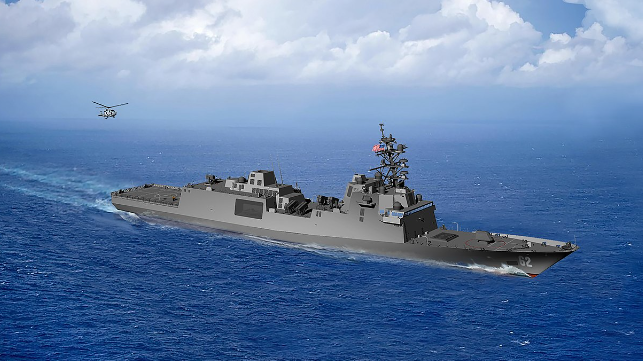With LCS in Mind, Congress Makes Navy Test New Frigate's Drivetrain

Wary of the mechanical problems that have plagued the Navy's littoral combat ship (LCS) program, the House and the Senate are requiring the service to carry out land-based testing for the propulsion system for its new future frigate, or FFG(X). The language for a mandatory shakedown program is part of this year's National Defense Authorization Act, or NDAA - an annual defense spending and policy bill that has passed every year for the past 59 years.
In April, the Navy awarded a contract for up to 10 FFG(X) frigates to Fincantieri Marinette Marine. The total potential contract value is $5.6 billion, and could grow if the Navy expands the class to a planned 20 vessels. The new series will displace the LCS in future production.
To reduce procurement risk, the Navy required FFG(X) bidders to submit options based on an existing, proven hull form. It ultimately selected a bid based on the joint Italian/French FREMM design, developed by Fincantieri and slated for production at the Marinette Marine yard in Wisconsin. However, Congress has concerns about the remaining technological risk in the new engineering plant.
"The conferees are concerned that significant risks remain in the FFG-62 program, including: cost realism; shifting to predominantly U.S. component suppliers instead of the mainly foreign suppliers used in the parent vessel design; and a complex Combined Diesel Electric and Gas Hull, Mechanical and Electrical (HM&E) drive train that has not previously been used on U.S. Navy ships," House and Senate conference negotiators wrote in an explanatory note.
The section requires the Navy to begin a land-based test program for the FFG(X) powerplant before the delivery of the first ship in the class (and completed before initial operational capability). The program must cover the vessel's main reduction gear - a source of serious, repeated difficulties on the Freedom-class LCS - along with its main and auxiliary engines, all power and shipboard control systems, and all other propulsion drive train components. It must also simulate all anticipated electrical load demands.
The testing requirements are specifically intended to avoid a repeat of the technical challenges encountered by the LCS program.

that matters most
Get the latest maritime news delivered to your inbox daily.
“Since lead ship deliveries in 2008 and 2010, both LCS classes have encountered significant, costly, and debilitating engineering failures," wrote the negotiators. "The conferees believe many of these LCS engineering failures would have been discovered, analyzed, and corrected faster with less negative operational impact had the Navy established a LCS [land based engineering and test site]."
The language is the latest in a series of oversight measures that Congress has imposed on Navy procurement. The Navy's most recent surface combatant programs have been dogged by cost overruns (USS Zumwalt), underperformance (LCS), delays (USS Ford) and mission-critical equipment malfunctions (USS Ford and LCS) - many driven by concurrent R&D and construction timelines. With this history, Congressional appropriators have been slow to fund some Navy proposals that entail technical risk, like the construction of as-yet-unproven large unmanned vessels.
